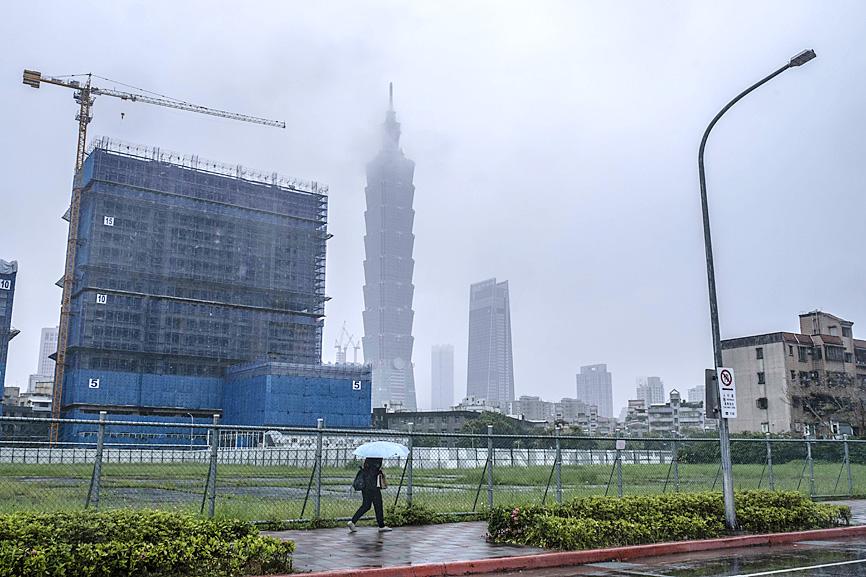Housing affordability grew worse in the first quarter, as the average mortgage burden climbed by 0.52 percentage points to 38.35 percent nationwide, a report released yesterday by the Ministry of the Interior showed.
The data suggest that mortgages accounted for a big chunk of the disposable income of households on average and this would worsen after the central bank raised interest rates twice and increased the mortgage burden by 1.5 percent.
The ministry classifies mortgage burdens as follows: below 30 percent, reasonable; higher than 30 percent, slightly high; more than 40 percent, relatively high; and more than 50 percent, overly high.

Photo: Lam Yik Fei, Bloomberg
Mortgage burdens in Taipei constituted 64.91 percent of household incomes, retreating from 65.09 percent three months earlier as housing prices became less expensive at 16.22 times the average household income, the ministry said.
Mortgage burden in New Taipei City ranked second at 51.45 percent, gaining 1.43 percentage points from the preceding quarter, the ministry said.
During the first three months of the year, mortgage burden rose by 1.58 percentage points to 45.08 percent of household income in Taichung, where housing prices were 11.26 times the average household income, the ministry said.
Meanwhile, Yilan, Hsinchu and Changhua counties, as well as Tainan and Kaohsiung, all saw mortgage burdens surpass 35 percent, but the figure in Taoyuan declined a fractional 0.26 percentage points to 31.5 percent.
Keelung, Chiayi County and Yunlin County are among the few in Taiwan where the mortgage burden remained below the reasonable threshold of 30 percent, the ministry found.
The report also showed that the home price index, which gauges fluctuations in residential property values in the nation, rose 2.99 percent from a quarter earlier to 121.01 in the first quarter.
The ministry attributed the increase to robust economic growth, low interest rates and inflationary expectations.
In the January-to-March period, Kaohsiung and Taichung saw the largest increase in the home price sub-index among the six special municipalities, rising 4.7 percent and 3.65 percent respectively from the preceding quarter, data showed.
The sub-indices for Taoyuan and Taipei saw the lowest increases of 2.7 percent and 1.91 percent respectively, the data showed.
Analysts said housing price changes would not affect the mortgage burden of existing homeowners even though price corrections might mitigate the burden of new borrowers.
Despite headwinds ahead for the market, housing prices would hold firm, because sellers believe property is a good defense against inflation and economic upheavals, they said.
Additional reporting by CNA

South Korea’s equity benchmark yesterday crossed a new milestone just a month after surpassing the once-unthinkable 5,000 mark as surging global memory demand powers the country’s biggest chipmakers. The KOSPI advanced as much as 2.6 percent to a record 6,123, with Samsung Electronics Co and SK Hynix Inc each gaining more than 2 percent. With the benchmark now up 45 percent this year, South Korea’s stock market capitalization has also moved past France’s, following last month’s overtaking of Germany’s. Long overlooked by foreign funds, despite being undervalued, South Korean stocks have now emerged as clear winners in the global market. The so-called “artificial intelligence

NEW IDENTITY: Known for its software, India has expanded into hardware, with its semiconductor industry growing from US$38bn in 2023 to US$45bn to US$50bn India on Saturday inaugurated its first semiconductor assembly and test facility, a milestone in the government’s push to reduce dependence on foreign chipmakers and stake a claim in a sector dominated by China. Indian Prime Minister Narendra Modi opened US firm Micron Technology Inc’s semiconductor assembly, test and packaging unit in his home state of Gujarat, hailing the “dawn of a new era” for India’s technology ambitions. “When young Indians look back in the future, they will see this decade as the turning point in our tech future,” Modi told the event, which was broadcast on his YouTube channel. The plant would convert

‘SEISMIC SHIFT’: The researcher forecast there would be about 1.1 billion mobile shipments this year, down from 1.26 billion the prior year and erasing years of gains The global smartphone market is expected to contract 12.9 percent this year due to the unprecedented memorychip shortage, marking “a crisis like no other,” researcher International Data Corp (IDC) said. The new forecast, a dramatic revision down from earlier estimates, gives the latest accounting of the ongoing memory crunch that is affecting every corner of the electronics industry. The demand for advanced memory to power artificial intelligence (AI) tasks has drained global supply until well into next year and jeopardizes the business model of many smartphone makers. IDC forecast about 1.1 billion mobile shipments this year, down from 1.26 billion the prior

People stand in a Pokemon store in Tokyo on Thursday. One of the world highest-grossing franchises is celebrated its 30th anniversary yesterday.